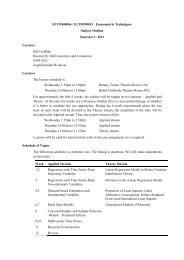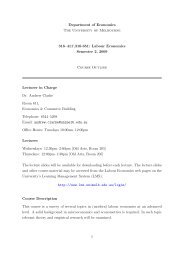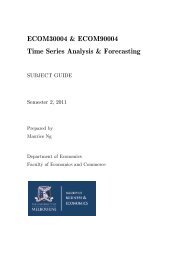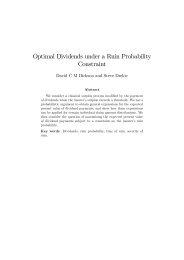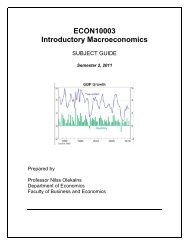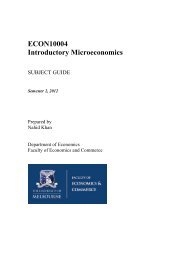A Model of Optimal Corporate Bailouts - Faculty of Business and ...
A Model of Optimal Corporate Bailouts - Faculty of Business and ...
A Model of Optimal Corporate Bailouts - Faculty of Business and ...
You also want an ePaper? Increase the reach of your titles
YUMPU automatically turns print PDFs into web optimized ePapers that Google loves.
Prior to 2007, most academic economists viewed government bailouts as aberrations<strong>of</strong> developing countries, artifacts <strong>of</strong> political patronage, or idiosyncrasies <strong>of</strong> the bankingindustry. The consensus view <strong>of</strong> governmental interventions generally—<strong>and</strong> corporate bailoutsspecifically—has been largely negative in light <strong>of</strong> the moral-hazard problems caused by suchinterventions. Even in the banking literature, where a few exceptions (discussed below) can befound, bailouts rarely garner more than grudging approval. This academic skepticism has along pedigree. As early as 1873, Walter Bagehot wrote:If the banks are bad, they will certainly continue bad <strong>and</strong> will probably becomeworse if the Government sustains <strong>and</strong> encourages them. The cardinal maxim is, thatany aid to a present bad bank is the surest mode <strong>of</strong> preventing the establishment <strong>of</strong>a future good bank.Almost a century <strong>and</strong> a half later, Bagehot’s admonition remains popular among economists. Inhis “Blueprints for a New Global Financial Architecture,” for example, ? opens with:Problem 1: Counterproductive financial bailouts <strong>of</strong> insolvent banks, their creditors, <strong>and</strong>debtors by governments, <strong>of</strong>ten assisted by the IMF, have large social costs. <strong>Bailouts</strong> areharmful for several reasons. First, they entail large increases in taxation <strong>of</strong> averagecitizens to transfer resources to wealthy risk-takers. Tax increases are alwaysdistortionary, <strong>and</strong> serve to accentuate the unequal wealth distribution. Second,by bailing out risk takers local governments <strong>and</strong> the IMF subsidize, <strong>and</strong> henceencourage, risk taking. Moral-hazard incentive problems magnify truly exogenousshocks that confront banking systems. Excessive risk taking by banks results inbanking collapses <strong>and</strong> produces the fiscal insolvency <strong>of</strong> governments that bail outbanks, leading to exchange rate collapse. Banks willingly <strong>and</strong> knowingly take onmore risks—especially default risks <strong>and</strong> exchange risks—than they would if theywere not protected by government safety nets.And yet, to the consternation <strong>of</strong> many economists, <strong>and</strong> contrary to much received academicwisdom, governments have time <strong>and</strong> again ridden to the rescue <strong>of</strong> banks <strong>and</strong> other “too bigto fail” institutions during economic crises. Notable recent examples include the controversialbailouts <strong>of</strong> General Motors <strong>and</strong> Chrysler in December 2008. Although the federal governmentprovided more than $80 billion in assistance, both companies had to file for Chapter11 bankruptcy protection by June 2009. Incumbent shareholders were wiped out, seniormanagement <strong>and</strong> board members were fired, <strong>and</strong> labor unions <strong>and</strong> dealers accepted significantconcessions.Nevertheless, in succeeding years, some commentators have begun to portray the automobilebailouts in more charitable tones. In November 2010, <strong>Business</strong>Week reported:General Motors Co.’s initial public <strong>of</strong>fering showed that while U.S. President BarackObama’s administration may lose billions on the auto-industry bailout, the nationalbudget <strong>and</strong> economy might be better <strong>of</strong>f for it.2




